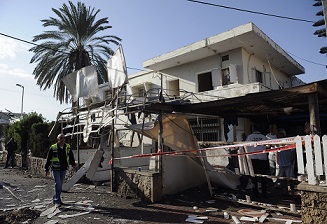By Sara Hussein (AFP)

Jerusalem – After 24 hours of violence on its Gaza border, the second such flare-up in less than a month, Israeli officials and commentators on Monday weighed the prospect of a major new military operation against Gaza.
A truce floated overnight appeared to be unravelling Monday morning, with militants firing another dozen or so rockets over the border, and the military saying it had carried out several overnight air strikes on targets in northern and southern Gaza.
The violence has prompted tough talk from Israeli leaders, with Prime Minister Benjamin Netanyahu warning the Jewish state was “prepared to escalate” its response, and Defence Minister Ehud Barak saying Gaza rulers Hamas would pay a “heavy price.”
Commentators said the warnings reflected discussions within the government about how to respond to the violence, with options ranging from a large-scale military operation to increased air strikes and the targeting of top militants under consideration.
“In his statements in the cabinet meeting [on Sunday], Netanyahu tried in effect to prepare public opinion for the possibility of such an operation,” Yossi Yehoshua wrote in the Yediot Aharonot daily.
“He was also shown plans that were prepared… in advance of a possible operation,” he added, saying Netanyahu was to meet foreign ambassadors on Monday in a bid to build an international consensus for any course of military action.
Speaking on condition of anonymity, a senior Israeli official confirmed Netanyahu was meeting the ambassadors “to prepare them for the possibility that, if need be, Israel will act in a more robust manner to protect our people.”
Israeli officials, current and former, said a tougher military response was necessary, though few seemed in favour of a large-scale operation similar to Operation Cast Lead, the devastating 22-day operation in Gaza which began at the end of December 2008.
Speaking to army radio, former military chief of staff Dan Halutz said it was time to “renew the targeted killings of Hamas’s senior leadership.”
“Before embarking on a broad military operation you need to try other things,” he said, recommending “targeted killing and attacking all assets belonging to Hamas.”
And former national security adviser Giora Eiland suggested halting imports to Gaza, and cutting its electricity supply.
He agreed that military action should target assets used by Gaza’s Hamas rulers, but not necessarily the Islamist movement’s leadership.
“There is a state, it has a government,” he told army radio. “It is responsible for what happens in its territory… Israel should react.”
Netanyahu confidant and fellow Likud party member Ofir Akunis told public radio he had “no doubt that a comprehensive military operation is just a matter of time.”
But Yediot Aharonot analyst Alex Fishman said it was “doubtful whether the political echelon has any interest in becoming entangled now… with a ground war.
“The dilemma… is how to create a limited military operation, so as not to lead Hamas to a situation in which it feels that it is losing its hold on power.
“The targets should be government and infrastructure,” he added. “We should avoid targeting the political echelon.”
Fishman said Washington had “given the green light” for Israeli action, noting that US ambassador Dan Shapiro had on Sunday reiterated support for Israel’s right to self-defence.
“These are code words that mean: We will accept an Israeli operation in Gaza,” he said.
Writing in the Israeli HaYom free-sheet, which is considered close to Netanyahu, commentator Yoav Limor said the current plan would involve “a number of response stages.”
“If Israeli fire encounters Palestinian fire, the IDF [Israel Defence Forces] will go up to the next stage. If Israeli fire encounters Palestinian restraint, quiet will be achieved.”

